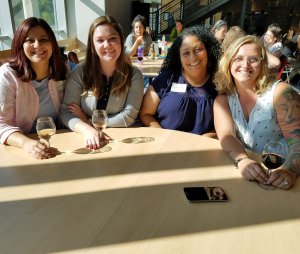by Mona Grife
Early on in my career, I would visit schools to invite students to sign-up for service-learning projects. One moment stands out in my mind. My colleague and I were just finishing up our short spiel in front of the class when a student quickly entered. As soon as he opened the door, the student was berated by the teacher for being late. The student said nothing. I could see humiliation in his eyes as he made his way to his desk. We made our way out and thanked the teacher. We were on our way out of the building, when we noticed that we forgot the sign-in sheet that had all the students’ contact info. My colleague and I looked at each other with fear in our eyes. We really needed that list, but we were not going back to that classroom. We didn’t want to be yelled at in front of the entire class. We agreed to email her later for the list.
Over the years, I went on to visit many more schools doing youth development work. As soon as I would enter a school, you could feel whether you were walking into a positive climate. I was greeted with a smile or a hello by either students or teachers, even if I walked in during a chaotic time. In Anne Arias’ recent blog post, Cultivating Belonging in Schools for Staff and Community Partners, she encourages us to answer this question, “What is your role in cultivating a sense of belonging and positive climate in your program, school, or partnership?”.
This is a question we’ve also been reflecting on as we plan the Whole Child, Whole Day: A Social & Emotional Learning Symposium. We know that for children and youth to thrive, we must create learning environments where children and youth feel like they belong, where they feel valued and supported. This also applies to adults.
The SEL symposium is just one day a year, but a perfect opportunity to create a learning space where folks feel engaged, supported, and inspired.
In addition to inspiring workshops, you’ll witness a day infused with intentional SEL practices and activities. Here are some examples of how we are doing this.



What can you do to help us in creating a positive, inclusive space? It starts with hello. Greet your colleagues. Introduce yourself to people you don’t know. Thank them for showing up and recognize that together we can support the whole child across the whole day. We look forward to meeting you on August 9th!
P.S.– You can learn more on how you can integrate these 3 SEL practices in your classrooms, programs, and adult learning spaces by visiting CASEL or Oakland School District’s SEL Signature Practices Play Book. Want to dig deeper? Check out OSPI’s SEL Online Modules.


